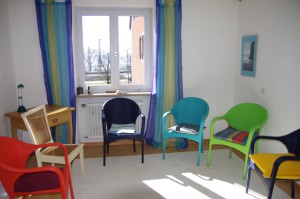Our intensive outpatient treatment program (IOP) for OCD opened in September 2011 in response to a growing need for evidence-based OCD specialty treatment in South Florida. Our Palm Beach County, Florida, practice utilizes the latest scientific advances in the treatment of OCD to develop a personalized, compassionate treatment plan that is tailored to help you reach your goals.
Treatment for OCD, OCD Spectrum Disorders, & Related Conditions
 Our intensive treatment program for OCD is designed to treat adults, adolescents, and children with all forms of OCD. We specialize in treating compulsive hand-washing and checking, as well as OCD subtypes that involve primarily mental rituals or a combination of behavioral and mental rituals (e.g., “Pure-O”, scrupulosity, “ROCD”, “HOCD”, hit-and-run OCD, harm obsessions, sexual obsessions, and maladaptive perfectionism).
Our intensive treatment program for OCD is designed to treat adults, adolescents, and children with all forms of OCD. We specialize in treating compulsive hand-washing and checking, as well as OCD subtypes that involve primarily mental rituals or a combination of behavioral and mental rituals (e.g., “Pure-O”, scrupulosity, “ROCD”, “HOCD”, hit-and-run OCD, harm obsessions, sexual obsessions, and maladaptive perfectionism).
In addition to our IOP for OCD, we offer separate treatment tracks for OCD-spectrum disorders and other severe anxiety disorders. Examples of these programs include intensive treatment of panic, hoarding, social anxiety, agoraphobia, body dysmorphic disorder (BDD), generalized anxiety disorder (GAD), separation anxiety, post-traumatic stress disorder (PTSD), specific phobias, and BFRBs such as trichotillomania (compulsive hair-pulling) and dermatillomania (compulsive skin-picking).
OCD Treatment Program Components
Program Goals
Our intensive treatment program for OCD is evidence-based, time-limited, and designed to help you make rapid progress in reducing your symptoms. Treatments are tailored to be interactive and developmentally appropriate for individuals of all ages, including kids, teens, and adults. Our goal is to empower you to stand up to your OCD and take your life back. We will work with you to understand your symptoms, clarify your treatment goals, and give you the tools you need to recover and gain control over your OCD.
Assessment
Treatment begins with sessions focused on comprehensive assessment and treatment planning. Assessment procedures involve clinical interviews with you (and with your permission, significant others) and various OCD assessment tools (e.g., the Yale-Brown Obsessive-Compulsive Scale [Y-BOCS] or the Children’s Yale-Brown Obsessive-Compulsive Scale [CY-BOCS]). We will conduct a functional analysis of your symptoms, so that we can better understand the relationships among your obsessions, compulsions, feared outcomes, and beliefs. Special attention will be paid to mental rituals and other covert compulsions, as previous treatment non-responses may be due to a failure to detect and address these more subtle (but extremely problematic) rituals.
In addition to clarifying your OCD symptoms, we will assess other coexisting conditions, such as depression and other anxiety disorders. We will also identify your areas of strength and other resources that will assist you in your recovery. Information gathered during your assessment will be used to make recommendations about the intensity of treatment that is most likely to help you reach your therapeutic goals.
Psychoeducation
Individuals enrolled in our program complete many “exposures” over the course of their treatment; however, we believe that the right preparation for exposure and response prevention (ERP) is also a vital component to treatment success. Early components of our program focus on psychoeducation about OCD, which emphasizes an in-depth understanding of obsessions, compulsions, and avoidance behaviors. We will discuss the neurobiology of OCD and what learning theory has taught us about how OCD develops and is maintained over time. We will also identify maladaptive beliefs and behaviors that perpetuate avoidance and maintain your symptoms. We will then help you develop more effective coping skills that will make you more resilient, such as the use of coping statements, motivation scripts, and mindfulness-based strategies.
Because no two patients are alike, we may also customize your treatment with optional modules designed to suit your particular needs. For example, some individuals may benefit from treatment strategies designed to enhance readiness for change. In other cases, optional interventions may be used to target your specific symptoms. For example, in cases of scrupulosity, initial treatment steps may involve belief clarification and/or consultation with religious professionals. Likewise, in cases of contamination-related OCD in which mistaken beliefs contribute to one’s symptoms, education may include the review of credible (e.g., peer-reviewed) sources of information about disease transmission and/or consultation with medical professionals.
Active Treatment
This stage of treatment integrates all previous stages and is the largest component of your intensive OCD treatment program. Using information from the assessment phase and what you’ve learned about OCD, we will develop a graduated exposure hierarchy that will allow you to confront and overcome your OCD symptoms in a systematic way. Because exposure without good response prevention will be ineffective, we will also develop response prevention guidelines that are tailored to your symptoms.
 We then will begin the process of exposure. Initial exposures will be low to medium-level exposures, and we will gradually work up to completing even the most challenging items on your hierarchy. Each exposure will be reviewed and debriefed; trouble-shooting will then take place (if needed). An individualized between-session homework plan will help you gain additional practice and/or mastery with similar exposures.
We then will begin the process of exposure. Initial exposures will be low to medium-level exposures, and we will gradually work up to completing even the most challenging items on your hierarchy. Each exposure will be reviewed and debriefed; trouble-shooting will then take place (if needed). An individualized between-session homework plan will help you gain additional practice and/or mastery with similar exposures.
As treatment progresses, you will develop more autonomy in designing and implementing exposures to target your remaining symptoms. Whenever possible, you’ll complete exposures in “real-life” situations. For example, we may offer you the option of completing exposures outside of our office setting. Exposure options may include shopping malls, restaurants, gas stations, police stations, churches, college campuses, libraries, movie theaters, dumpsters, tall buildings, cemeteries, the beach, or your own home, school, or workplace. Other exposures may involve travel by car, boat, bus, or plane. Our goal is to help you take what you’ve learned in treatment and apply your skills to whatever challenges might present themselves in your daily life.
In addition to formal exposures, session time may also be devoted to CBT-based cognitive restructuring exercises, mindfulness practice, and other evidence-based strategies. In addition to individual therapy, we may also recommend family sessions, couples sessions, or parenting sessions. When working with younger patients, we require that parents receive general education about OCD and be involved in the treatment process in some capacity. Although the vast majority of treatment sessions will consist of individual meetings with the child, parents will be invited to attend parents-only sessions that may focus on relevant topics, such as how to provide encouragement without reassurance, how to be a helpful “exposure buddy”, or how to develop and implement an effective behavior plan / incentive plan. Parents will also be taught the “Do’s and Don’ts of Successful Exposure” and will learn how to lead their child in exposures so that these strategies can be continued after discharge from our program.
Optional Components
• Medication Management (optional)
Although we do not have a psychiatrist on staff, we work closely with several local psychiatrists who specialize in treating OCD. Some of these psychiatrists treat adults, whereas others specialize in treating children and adolescents. If you are not currently on medication and would like to receive combination treatment, we can refer you to a local psychiatrist and coordinate your care. If you already take medication, we will happily work with your current doctor.
• Group/Joint Sessions (optional, when available)
 Group therapy components (or joint treatment sessions) may be offered depending on patient interest and the availability of other patients with similar symptom profiles; however, our IOP for OCD typically involves individual therapy only. If you are interested in group therapy components, you’re invited to inquire about the availability of these options. Recent group treatment modules have targeted somatosensory symptoms (obsessive breathing/swallowing), Pure-O OCD (fear of harming others), scrupulosity, and contamination symptoms (“Grunge Group”).
Group therapy components (or joint treatment sessions) may be offered depending on patient interest and the availability of other patients with similar symptom profiles; however, our IOP for OCD typically involves individual therapy only. If you are interested in group therapy components, you’re invited to inquire about the availability of these options. Recent group treatment modules have targeted somatosensory symptoms (obsessive breathing/swallowing), Pure-O OCD (fear of harming others), scrupulosity, and contamination symptoms (“Grunge Group”).
OCD Program Treatment Planning Process
Treatment planning begins with a brief initial phone consultation during which you will discuss your current symptoms and treatment goals. If this brief phone consultation indicates that intensive treatment might be helpful, you will be asked to schedule a formal in-person consultation in our office. During this consultation, we will obtain comprehensive information about your symptoms and previous treatment history. We also utilize a variety of standard measures to assess symptoms of OCD and comorbid conditions, including the Y-BOCS, CY-BOCS, and specific measures focusing on OCD-related cognitions and behaviors. This information is then integrated to develop a formalized exposure and response prevention (ERP) based treatment plan.
OCD Treatment & Comorbid Conditions
Many of the individuals we treat in our program have coexisting conditions, such as depression, or symptoms of panic, social anxiety, post-traumatic stress disorder (PTSD), phobias, or body dysmorphic disorder (BDD). Many also have tics or body-focused repetitive behaviors like trichotillomania. Our assessment process has been designed to detect these comorbid conditions, so that we can tailor treatment accordingly.
 In cases in which other conditions may interfere with effective OCD treatment, treatment may focus first on clinical issues other than OCD. In addition to being experienced in ERP and cognitive behavioral therapy, we are also experienced in other therapy approaches, including motivational interviewing, acceptance and commitment therapy (ACT), habit-reversal training (HRT), comprehensive behavioral (ComB) treatment, and mindfulness-based approaches. These evidence-based approaches allow us to work effectively with individuals with a variety of comorbid diagnoses.
In cases in which other conditions may interfere with effective OCD treatment, treatment may focus first on clinical issues other than OCD. In addition to being experienced in ERP and cognitive behavioral therapy, we are also experienced in other therapy approaches, including motivational interviewing, acceptance and commitment therapy (ACT), habit-reversal training (HRT), comprehensive behavioral (ComB) treatment, and mindfulness-based approaches. These evidence-based approaches allow us to work effectively with individuals with a variety of comorbid diagnoses.
For example, many individuals with OCD also have comorbid depression. If you’re depressed, we may address your depression through cognitive behavioral therapy and/or recommend that you consult with a local psychiatrist about medication management options. We also treat depression through acceptance and commitment therapy (ACT), which has emerged as a promising evidence-based treatment for depression.
When we treat individuals who have both OCD and panic disorder, we may address panic symptoms prior to beginning ERP. Treatment typically involves psychoeducation about the fight-or-flight system and the physiology of panic. We then address maladaptive and/or inaccurate beliefs about the consequences of panic and avoidance behaviors that maintain the panic cycle. We then develop an exposure hierarchy to decrease fear of panic-related bodily symptoms and agoraphobic situations.
OCD Treatment – Family Components
 We believe that treatment success can be greatly enhanced by building the right “treatment team”. This treatment team often includes parents, family members, friends, teachers, healthcare professionals, and other important people in your life. It is important that these individuals become knowledgeable about factors that can either strengthen or weaken your OCD. These individuals also can support your recovery by providing assessment-related information or by giving you encouragement as you actively face your symptoms. Sometimes family and friends may participate directly in your exposures. For our younger patients, parents and other family members are involved in treatment whenever possible. Teachers often provide assessment data that is used in treatment planning. At your request, we can also educate your teacher about OCD and recommend classroom-based strategies that can help support your child’s recovery. As noted previously, some individuals may also benefit from supplementing individual therapy with family sessions, couples sessions, or parenting sessions.
We believe that treatment success can be greatly enhanced by building the right “treatment team”. This treatment team often includes parents, family members, friends, teachers, healthcare professionals, and other important people in your life. It is important that these individuals become knowledgeable about factors that can either strengthen or weaken your OCD. These individuals also can support your recovery by providing assessment-related information or by giving you encouragement as you actively face your symptoms. Sometimes family and friends may participate directly in your exposures. For our younger patients, parents and other family members are involved in treatment whenever possible. Teachers often provide assessment data that is used in treatment planning. At your request, we can also educate your teacher about OCD and recommend classroom-based strategies that can help support your child’s recovery. As noted previously, some individuals may also benefit from supplementing individual therapy with family sessions, couples sessions, or parenting sessions.
OCD Intensive Treatment – Session Frequency
Because OCD affects each person differently, our intensive OCD treatment program is based around individual therapy sessions, which are scheduled in 1-hour increments. All therapy is conducted by doctoral level, licensed clinical psychologists. Our typical intensive program involves 2-4 hours of active therapy time for 5 days per week; however, your treatment program will be designed to address your specific needs. Weekend sessions may be arranged and/or recommended in some situations. Although group therapy is not a standard component of our OCD treatment program, group/joint treatment sessions may be arranged at your request if we have other individuals currently enrolled in our program who have similar symptom profiles.
OCD Intensive Treatment – Program Length
In our experience, on average, individuals improve significantly over the course of approximately 3-4 weeks. Some individuals may make more rapid progress and achieve symptom reduction more quickly than this, whereas others may require more extended treatment to reach their therapeutic goals. Your total length of stay is flexible and can be extended per your individual needs.
OCD Treatment Program – Self-Directed Homework
We are invested in helping you generalize your treatment gains to daily life. Consistent with this goal, we will assign you daily therapy assignments that build upon the work that you completed earlier in the day. Completion of these homework assignments may take up to 2 hours per day.
Relapse Prevention for OCD
Relapse prevention is emphasized over the entire course of treatment, and specific relapse prevention strategies are covered in even greater detail in later treatment sessions. Our relapse prevention strategies include:
• Understanding the difference between a “lapse” and a “relapse”.
• Developing appropriate expectations about the need to incorporate ongoing symptom maintenance efforts in your daily life.
 • Formulating a specific, individualized post-discharge recovery plan that you can use to continue to make progress even after you are discharged from our program.
• Formulating a specific, individualized post-discharge recovery plan that you can use to continue to make progress even after you are discharged from our program.
• Learning to recognize changes in your symptoms and having a multi-step plan in place to help maintain your gains.
• Recognizing and resisting subtle avoidance behaviors that can grow over time.
• Anticipating challenging situations (e.g., major stressors, life transitions) that may make your OCD flare up, and developing specific strategies for negotiating these challenges (e.g., “inoculating” yourself against future challenges through the use of imaginal exposure or role-play).
• Identifying ways for others to help support you in your continued recovery.
If you’re a local patient, we also encourage you to utilize our free monthly support group as part of your ongoing relapse prevention efforts.
OCD Treatment Program – Follow-Up Care
After you complete our program, we will help you smoothly transition back into daily life. If you have a regular therapist, we will consult with them in-person or via telephone/video conference regarding your treatment and your relapse prevention plan. If you do not have a regular provider, we would be happy to provide your follow-up care. Some individuals find that it is helpful to maintain regular contact with our office in some capacity for several months after the completion of our program in order to trouble-shoot any transitional issues that might arise. Follow-up options include weekly/biweekly/monthly office visits or telephone/video-conference based visits.
Treating OCD in Out-of-Town Patients
We provide intensive treatment for both local and out-of-town patients. Out-of-town patients are responsible for arranging their own travel and accommodations in Florida during their treatment but have the option of taking advantage of some of the special rates we have negotiated with several Palm Beach County, Florida hotels. For information about these special rates, please contact our office. Many hotel and resort options are within walking distance or easy driving distance to our clinic and are located near restaurants, upscale shopping, the beach, or other local amenities.
Intensive OCD Treatment – Additional Information
 We believe that OCD is fundamentally a disorder of doubt and uncertainty. This idea is embodied in our approach to treatment, which you can read more about on our website (www.psychologyandbehavior.com) or via our Director’s Blog (www.steveseay.com).
We believe that OCD is fundamentally a disorder of doubt and uncertainty. This idea is embodied in our approach to treatment, which you can read more about on our website (www.psychologyandbehavior.com) or via our Director’s Blog (www.steveseay.com).
Our specialized practice allows us a flexibility that is not readily available in other settings, which we use to personalize treatment to suit your specific needs. Depending on the nature of your symptoms, some of your treatment will likely occur outside of traditional office settings. We believe that the more closely your exposures reflect real life situations, the more easily your treatment gains will translate to your daily life. We look forward to combining your desire for change with our compassion, energy, enthusiasm, and expertise in OCD treatment to help you change your life.
Please call our office if you would like more information about our program, or if you would like to schedule an initial consultation.





